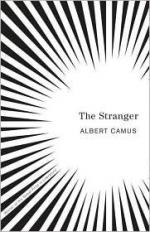|
|
The Stranger Topic Tracking: Observation
Observation 1: Meursault looks around at his mother's funeral service and observes the elderly. He looks closely at Monsieur Perez, the old ladies chewing their gums, and the 'typical' funeral scene. Although he observes these images and people, he does not form emotionally attached opinions. He simply states descriptions and his immediate sentiment regarding them - both hot and cold.
Observation 2: At the café, Meursault looks around and observes the happy couples flirting outside. He notices every living creature in nature, from the birds to the trees around him. When he goes home, he turns this inspection inward as he looks at his reflection in the mirror. Noticing some old bread laying around his room, he realizes that life is back to normal. He must return to work the following day.
Observation 3: Marie and Meursault dine at Celeste's. While eating, Meursault looks around and observes a single woman eating at a nearby table. He scrutinizes her behavior, from her calculation of the tip to her perusal of a long magazine. When she leaves, he soon forgets about her.
Observation 4: When Meursault returns to the same place on the beach, he unwillingly observes his surroundings. While he normally looks around and takes in every detail, this time, the surrounding details seem to overtake him. The beating sun shines down on him, the heat overwhelms him, and the reflection of the blade cause him to see the world through different eyes. He is not observing the Arab through his typical view; instead, he simply sees a man with a knife and feels he must stop him from attacking.
Observation 5: Meursault gets used to his prison surroundings, observing every crack in the wall and all the people around him. During visiting day, he looks out at the sea of women screaming at their respective loved ones locked up inside with him. He notices their faces, their emotions, and their words, and wonders about their relationships. He also sees Marie and contemplates his relationship with her.
Observation 6: While in prison, Meursault has little to observe. So, he turns his tendency to observe the intricacies of the outside world inside his memories. He thinks back to beautiful sunny days on the beach and his apartment and realizes that these memories can keep him satisfied for years in prison.
Observation 7: Meursault looks around the court to observe the formalities. He sees the two lawyers, the three judges, each dressed in red and black, and then his friends - the witnesses. He scrutinizes every minute detail of the scene from the court reporters to the firm handshakes between lawyers.
Observation 8: When court is called back into session, Meursault walks in and observes the same environment as before. He notices the same faces, the same judges, jurors, and witnesses. He continues listening to the case, as if here were not the man on trial.
Observation 9: When court is adjourned, Meursault feels the sun and heat on his body. It makes him return to his inner observations - his memories. He recalls a time when he was truly happy, outside, and free from this frustration.
Observation 10: When Meursault is found guilty of murder, he is returned to his prison cell to await execution. He observes the prison environment again and the idea of an execution. He recalls a story of his father attending an execution. In his observations, he realizes that there are few public records of executions.
Observation 11: Meursault passes the time in prison by observing his surroundings again. He especially thinks during dawn, when the sun is over the horizon, shining clarity onto the land below. He observes nature at this time. He also takes this time to observe his own appeal - others and himself.




